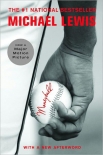Moneyball by Lewis, Michael (books to read in your 30s TXT) 📗

Book online «Moneyball by Lewis, Michael (books to read in your 30s TXT) 📗». Author Lewis, Michael
He lays off the first pitch. It’s a ball, just low. Another round of horrible facial expressions, and Grimsley’s ready again. The second pitch is another fastball, but it’s high in the strike zone. Hatty takes his short swing; the ball finds the barrel of his bat, and rockets into deep right center field.
He leaves the batter’s box in a crouching run. He’s moving just as fast as he does when he hits a slow roller to the third baseman. He doesn’t see Grimsley raging. He doesn’t hear fifty-five thousand fans erupting. He doesn’t notice the first baseman turning to leave the field. He doesn’t know that there’s a fellow from Cooperstown following him around the bases, picking them up, and will soon come looking for his bat. The only one in the entire Coliseum who does not know where the ball is going is the man who hit it. Scott Hatteberg alone watches the ball soar through the late night air with something like detachment.
The ball doesn’t just leave the park; it lands high up in the stands, fifty feet or so beyond the 362 sign in deep right center field. When he’s finally certain that the ball is gone for good, Scott Hatteberg raises both hands over his head, less in triumph than disbelief. Rounding first, he looks into the Oakland dugout. But there’s no one left inside—the players are all rushing onto the field. Elation transforms him. He shouts at his teammates. He’s not saying: Look what I just did. He’s saying: Look what we just did! We won! As he runs, he sheds years at the rate of about one every twenty feet. By the time he touches home plate, he’s less man than boy.
And, not five minutes later, Billy Beane was able to look me in the eye and say that it was just another win.
Chapter
XII
The Speed of the Idea
Billy Beane never allowed himself sentimental feelings about a game, or a player, or his own experiences. He’d walled himself off from his finer feelings, or tried to. He defined himself by his distaste for, rather than his romance with, his ballplaying past. This set him apart from most people who made their living in the game. Former big league ballplayers usually have friendly ghosts.
The sympathy most former ballplayers had for their own professional experiences—for the way they played the game—was nevertheless a problem for the anti-traditional Oakland A’s. They needed to employ men with experience, but with that experience came the usual feelings and hunches and instincts. Billy often felt as if he were having to fight the past in his players and coaches—that Paul DePodesta was the only person in the entire organization who drew the same conclusions from the same data as he did. And, as the play-offs approached, this problem always intensified.
One day before the end of the regular season, Ron Washington and Thad Bosley, the A’s infield and hitting coaches, came together in a batting cage, just off the visitors’ clubhouse in The Ballpark in Arlington. Their talk began innocently enough. The team was about to play its second to last game of the regular season, against the Texas Rangers. Ray Durham was getting in some extra hacks, with Wash and Boz looking on, less coaches than connoisseurs.
Crack!
Wash and Boz were having one last, soulful look at Ray Durham before Durham went the way of all of Billy Beane’s rent-a-stars. There was little chance Billy would re-sign Ray Durham for next season. There wasn’t enough wrong with him. There wasn’t anything wrong with him. Durham had what every general manager in the game had always prized: pop in the leadoff slot, speed on the base paths, and a reputation, less deserved now than five years ago, as a good second baseman. In the free market Durham probably would be overpriced; but even if he was fairly priced, Billy wouldn’t keep him. There was nothing inefficient about the market for Ray Durham’s services.
“Look at Ray,” says Wash.
Crack!
“That little sonofabitch got some juice in that body,” says Wash. “He will hurt you, you throw the ball in the wrong place.”
“Swings like a man,” says Boz. “And that man’s a menace.”
“He stands up there like some little Punch and Judy,” says Wash. “But he can hurt you.”
Crack! It’s unclear whether Ray is listening to any of this.
“You know what impressed me the most about Ray when he first came over?” says Boz. “The way he runs down the first-base line.”
“He’s the only base stealer we got,” says Wash. “You know what a base stealer is?”
I assumed I didn’t.
“A base stealer is a guy who when everyone in the goddamn yard know he gonna get the bag, he gets the bag.”
Crack!
Wash had been recruited to play baseball by the Kansas City Royals in the early seventies, at a time when the Royals were trying to take track stars and turn them into baseball players. Those Royals had made a fetish of speed, and Wash, a speedster, was the beneficiary. The way Wash tells it, with the first pitch of every game he and his teammates started running, and they didn’t stop until the last. “There was sometimes you didn’t run,” he says, but then he has to think hard about what times those might be. “You didn’t run on Nolan Ryan,” he finally says, “because when you ran on Nolan Ryan all you did was piss Nolan Ryan off. You’da kept your ass on first base, the hitter





Comments (0)